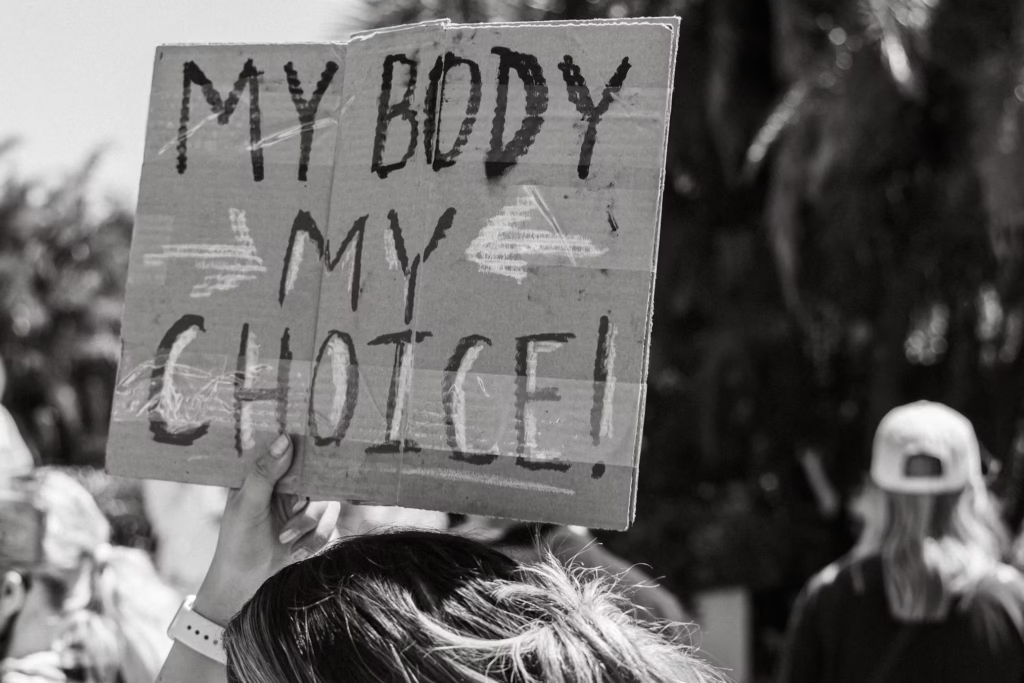One of the most popular talking points for pro-choice abortion policies is the right to bodily autonomy. The woman should have a right to her own body, so she should have a right to abort the baby inside her, right?
This article will explain the conservative argument against this talking point and dive into a tricky hypothetical that often stumps conservatives.

In This Argument…
- Why the fetus is worthy of the right of life
- How ‘my body my choice’ falls apart and why it’s not your body
- How to dismantle the organ-transplant (kidney) analogy
Table of Contents
The Bodily Autonomy Argument
The pro-choice argument that you often hear as “my body, my choice” stems from the idea that if it’s your own body you should be able to do whatever you want with it. They argue that regulating or banning abortions infringes on the right to bodily autonomy.
It’s usually argued that conservatives are trying to control women and the government should not control women’s bodies. In the case of abortion, this is not true. Here’s why the autonomy slogan, taken to its logical end, actually supports protecting the child.
The Conservative Response
The pro-life conservative argument against abortion stems from the idea that the baby inside the woman has a right to life, that it gained that right at conception, and it’s not just a clump of cells. Scientifically, we know that human life starts at conception.
According to “The cell biology of fertilization: Gamete attachment and fusion” (Siu, Wong, & Evans), from 2021, a peer-reviewed article published in The Journal of Cell Biology, it confirms through detailed scientific explanation that at fertilization a human life begins. To be more specific, a genetically distinct human is created at the moment of fertilization, distinct from the mother and the father.
Read More: Does Life Begin at Conception?
Since we know that the baby is a distinct human being, a popular conservative argument is saying “It’s not your body, it’s the baby’s body, so ‘my body my choice’ doesn’t apply.” This doesn’t deny the woman’s bodily autonomy, but instead emphasizes that another human body is now involved. If bodily autonomy is a fundamental right, then, on the same principle of equal treatment, the baby, being a distinct human being, should also be entitled to that right.
So ironically, the bodily autonomy argument can actually strengthen the pro-life position. If both lives matter, then the mother’s autonomy must be weighed against the baby’s equal right to life and bodily protection.
The pro-choice activists must then argue that even if we grant that the baby is a human with a right to life, it doesn’t automatically give the baby the right to use someone else’s body because of some other factor like location or development. This can be an extremely slippery slope which can be used to justify many things against anyone who is seen to “not have a right to life.”
The Organ Transplant Argument
If pro-choice activists argues that the baby doesn’t have the right to use someone else’s body to survive, he or she may bring up this hypothetical argument:
“Suppose someone will die without a kidney transplant and you are the only compatible donor. Even if you could save their life by donating one of your kidneys, and even if you’re the only one who can, the law does not force you to donate it. It’s understood that you have bodily autonomy. If we don’t force someone to donate a kidney to save a life, why should we force a woman to use her uterus to sustain a pregnancy?”
It’s a pretty compelling argument at first but can easily be torn apart. Watch Kristan Hawkins, an American pro-life activist and president of Students for Life of America and Students for Life Action, masterfully shut down this argument:
In short, the organ-donation analogy may initially sound persuasive, but it fails to capture the moral gravity of abortion. In the case of declining to donate a kidney, you’re refusing to save a life you did not help create. But in abortion, the child’s life is not only dependent on the mother, it exists because of the parents’ actions.
Abortion is not a passive withdrawal of support. Instead, it is the direct and intentional ending of that dependent child’s life. Intention matters. The mother isn’t simply “unplugging” from a stranger, she is actively choosing to end the life of her own offspring. This makes abortion morally distinct from organ donation, which involves no prior responsibility and no direct act of killing.
What About In Rape and Incest Cases?
Even in cases of rape or incest, the organ-donation analogy still fails. In that analogy, you’re being asked to save the life of a stranger you had no role in creating. But in pregnancy, even one caused by a horrific act like rape, the child is not the attacker, it’s an innocent human life. Abortion isn’t just refusing to help, it’s the intentional ending of that life.
Also, the mother deserves profound care and support for the trauma she endured, but that compassion should never require ending another innocent life.
Ultimately, the baby is a human life worthy of the right to life, and screaming ‘my body my choice’ simply does not account for the baby’s body.
The Bottom Line
- The fetus is a distinct human life at conception, making it worthy of the right of life.
- It’s not just the woman’s body that should be taken into consideration, it’s also the baby’s body, and the baby’s body is not the woman’s body.
- The organ-transplant analogy falls apart because abortion is the intentional killing of a child, not merely the refusal to offer aid. In abortion, a human life is directly ended (regardless of how it began), whereas declining to donate an organ involves no direct act of killing and no moral responsibility for the life in question.
